4 Dairy Companies With the Worst Food Quality Practices
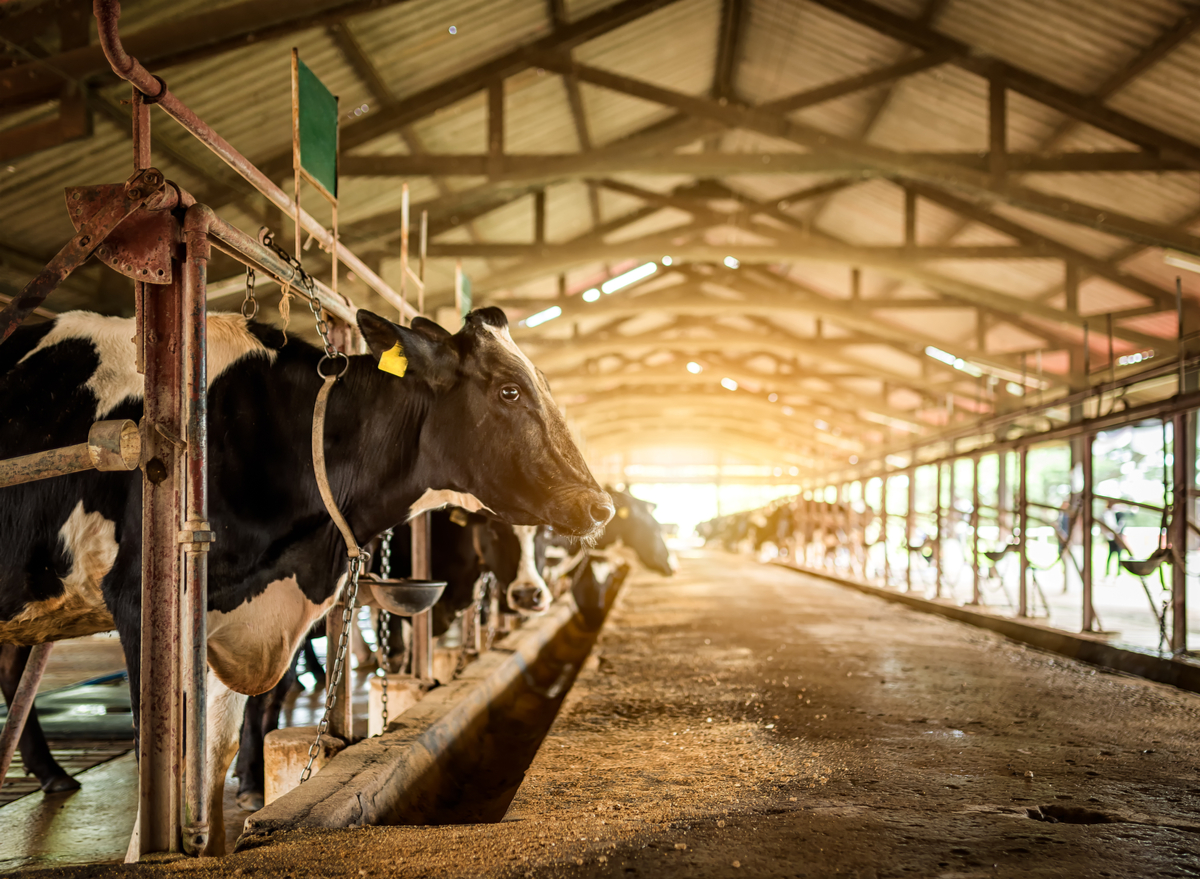
Got milk? Maybe not. Since 1975, Americans' consumption of traditional dairy milk has dropped by 40%, according to The New York Times. What was once a staple in the American diet is steadily falling out of favor as consumers increasingly embrace non-dairy alternatives like almond, soy, and oat milk. In recent years, milk-drinkers are learning more about where their dairy really comes from, and the food-quality practices that are used when manufacturing milk and other products.
Gen Z and Millennials, in particular, are adopting plant-based alternatives, according to researchers at McKinsey & Company. A 2021 study pointed to concerns for personal health, animal welfare, and environmental impact as major factors. Research shows dairy production has a considerable effect on climate change–worldwide, an estimated 34% of annual greenhouse-gas emissions come from our global food systems, according to a 2021 Nature Food study. Experts say plant-based alternatives have a much lower environmental impact in emissions, land use, and water use compared to dairy milk.
Competition is booming as animal welfare and environmental concerns grow
Plant-based milks are expanding at a 10% growth rate compared to dairy milk's 3%. Strategic Market Research expects the $35 billion global plant-based milk market to grow 15% in the next seven years to $123 billion. (Researchers say lactose intolerance and a rise in vegan diets is fueling the industry's growth.)
Meanwhile, some consumers are moving away from dairy as poor food-quality practices—including animal cruelty, deceptive marketing, and sustainability problems—come to light.
As animal-welfare scientists look into whether dairy farming is cruel to cows, customers and advocacy groups are urging dairy producers to change their practices. The National Milk Producers Federation, which represents most of the country's 35,000 dairy farmers, says it's trying to promote better animal welfare. That means more frequent veterinarian farm visits, regular training on humane cow handling, and phasing out the controversial practice of tail docking.
It's a contentious issue: while some farmers say a few actors are making the industry as a whole look bad, animal-welfare advocates insist there is no such thing as humane dairy farming.
Indeed, past investigations into poor food quality practices have soured public opinion when it comes to large-scale dairy operations. Critics and advocacy groups say transparency in the dairy industry is still lacking. Read on to see which dairy companies have been called out for the worst practices.
Fair Oaks Farms and Fairlife
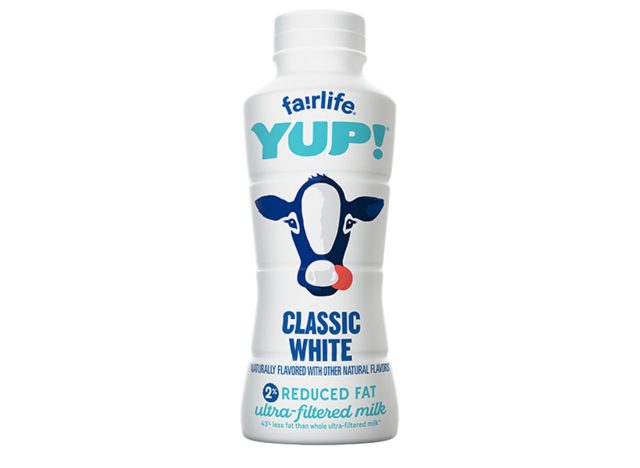
In 2019, Fair Oaks Farms, a large dairy in northwest Indiana that supplied milk to the popular ultra-filtered milk brand Fairlife, came under fire for its alleged abuse of calves and cattle. The non-profit animal welfare group Animal Recovery Mission (ARM) sent an agent undercover at Fair Oaks, one of the largest dairy farms in the U.S. In one video, some workers are reportedly shown throwing calves, hitting them with bottles, and kicking them.
The videos angered customers and mobilized protests. Animal cruelty charges were filed against three employees, and a civil-action lawsuit was filed against Coca-Cola and others for falsely advertising that Fairlife milk came from humanely treated cows.
In April 2022, Coca-Cola, Select Milk, Fair Oaks Farms, and Sue and Mike McCloskey (owners of Fair Oaks Farms and founders of Fairlife) agreed to pay out a $21 million settlement. Since the incident, the brand pledged to implement more animal welfare oversight, including camera monitoring and unannounced audits by third parties.
Organic Valley Dairy Co.
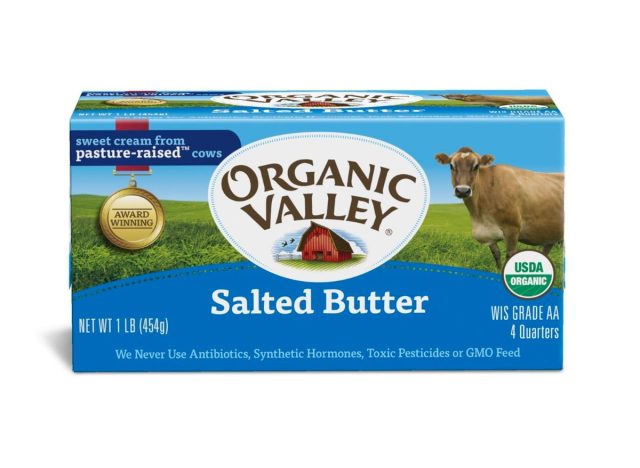
Some dairy companies have come under scrutiny for seemingly deceptive marketing practices. In 2022, a class action lawsuit was filed against Organic Valley, a farmer-owned cooperative. The suit alleges that the messages on milk cartons, depicting cows in idyllic green pastures, are deceptive to consumers. Amber Takahashi-Mendoza, an Oroville, Calif., resident claimed that Organic Valley misleads consumers into believing it treats its dairy animals humanely while the company prematurely removes newborn calves from their mothers.
People for the Ethical Treatment of Animals (PETA) filed the lawsuit on behalf of Takahashi-Mendoza in the Superior Court of California. The advocacy group said the woman "accuses the company of misleading her into buying its products at premium prices because it falsely claims to treat cows 'with love'—when in fact it separates newborn calves from distraught mothers."
Just last week, PETA announced a "precedent-setting victory in court," after a federal judge denied a motion to dismiss the lawsuit, ruling that Organic Valley's carton labels could be deemed "misleading because consumers could plausibly expect that such practices would not include the early separation of mother and calf."
Reitz Dairy Farm
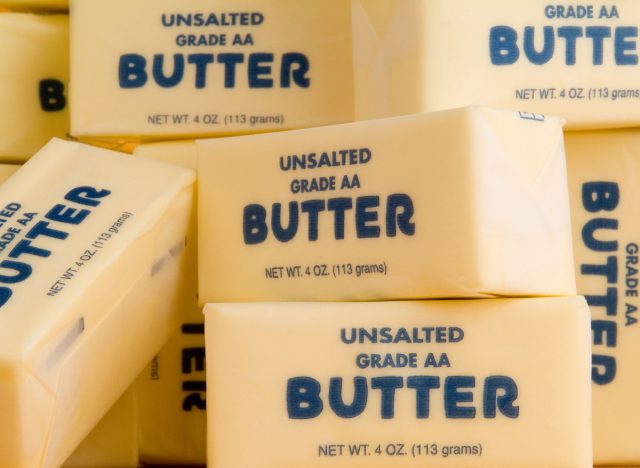
This family-owned dairy farm near Shamokin, Pa., has been repeatedly called out for alleged mistreatment of livestock. In 2009, PETA alleged that the facility, which supplied milk to national brand Land O'Lakes, routinely neglected and abused cows in "filthy" living conditions. The milk suppliers were facing 21 misdemeanor counts of animal cruelty, but Land O'Lakes sent a team of four independent veterinarians to the farm, which reported no evidence of animal mistreatment.
While the case was dismissed, in 2019 PETA launched a new round of allegations against the same dairy operation after receiving four whistleblower complaints from employees. In an affidavit, an undercover PETA field observer reported incidents of alleged abuse or neglect involving 28 cows and 120 calves.
PETA presented video evidence to the Pennsylvania State Police, which opened an investigation. State troopers, accompanied by the Reitz family and the farm's veterinarian, inspected the premises but observed "no violations of animal cruelty laws," according to The Daily Item.
PETA called the authorities' conclusion "incomprehensible," given the recorded footage, which the group also released publicly.
Threemile Canyon Farms
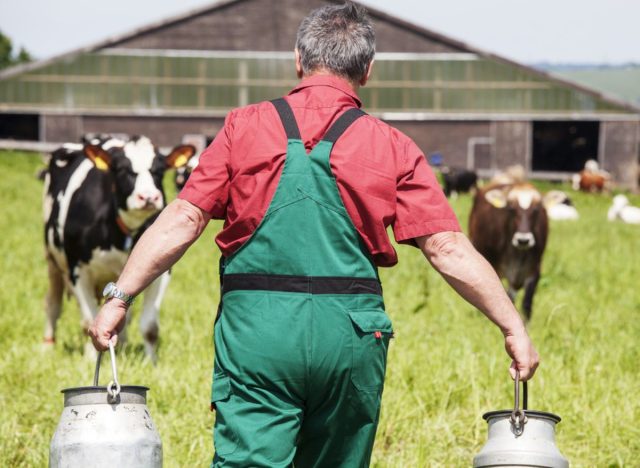
In 2022, Oregon's largest dairy was accused of violating air pollution rules by the environmental advocacy non-profit Food & Water Watch. The non-profit says Threemile Canyon Farms—a mega-dairy said to house more than 55,000 dairy cows just for milking—falsely claimed to be following all environmental regulations when it applied for lucrative credits in California for reducing greenhouse emissions. The California Air Resources Board told Oregon Public Broadcasting it would investigate the claims.
It's not the first time the dairy farm faced scrutiny for alleged pollution. Between June 2019 and September 2020, the Oregon Department of Environmental Quality fined Threemile $19,500 for exceeding its maximum allowed particulate matter pollution at the facility five times. Food & Water Watch says Threemile is just one of 11 mega-diaries that produce enormous amounts of heat-trapping gases that warm the planet and fuel droughts and wildfires.
- Source: https://www.ncbi.nlm.nih.gov/pmc/articles/PMC7912826/
- Source: https://journals.plos.org/plosone/article?id=10.1371/journal.pone.0250850
- Source: https://www.opb.org/article/2022/01/27/dairy-methane-oregon-threemile-california-energy-credits/#:~:text=The%20environmental%20advocacy%20nonprofit%20Food,low%2Dcarbon%20fuel%20standard%20program.
- Source: https://www.oregon.gov/deq/nr/102721wofPNW.pdf









